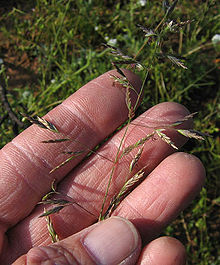Poa secunda
| Poa secunda | |
|---|---|

| |
| Scientific classification | |
| Kingdom: | Plantae |
| Clade: | Tracheophytes |
| Clade: | Angiosperms |
| Clade: | Monocots |
| Clade: | Commelinids |
| Order: | Poales |
| Family: | Poaceae |
| Subfamily: | Pooideae |
| Genus: | Poa |
| Species: | P. secunda
|
| Binomial name | |
| Poa secunda | |
| Synonyms[3][4][5] | |
|
N O T E : This list has been aggregated from three sources, each having considerably differing lists of taxa
| |
Poa secunda (variously known by the common names of Sandberg bluegrass,[2][3][4] alkali bluegrass,[4] big bluegrass,[4] Canby's bluegrass,[2] Nevada bluegrass,[4] one-sided bluegrass,[3] Pacific bluegrass,[2] pine bluegrass,[2] slender bluegrass,[2] wild bluegrass,[4] and curly bluegrass[1]) is a widespread species of perennial bunchgrass native to North and South America.[4] It is highly resistant to drought conditions, and provides excellent fodder;[3] and has also been used in controlling soil erosion,[4] and as revegetator,[4] often after forest fires.[6] Cultivars include 'Canbar', 'Service', 'Sherman', and 'Supernova'.[7] Historically, indigenous Americans, such as the Gosiute of Utah, have used P. secunda for food.[8] It was originally described botanically in 1830 by Jan Svatopluk Presl, from a holotype collected from Chile by Thaddäus Haenke in 1790.[2]
Native distribution
[edit]- In North America, Poa secunda is native to Canada (in Alberta; British Columbia; eastern Quebec; southern Saskatchewan; southern Yukon Territory; and, rarely, in Ontario), the U.S. (in southeastern Alaska; Arizona; California; Colorado; the Dakotas; Idaho; Isle Royale in Michigan; Montana; northwestern Nebraska; Nevada; New Mexico; Oregon; Utah; Washington; and Wyoming), and northwestern Mexico.[4]
- In South America, it is native to Argentina (found in Chubut; Neuquén; and Santa Cruz), and central Chile.[4]
References
[edit]- ^ a b NatureServe (2 June 2023). "Poa secunda". NatureServe Network Biodiversity Location Data accessed through NatureServe Explorer. Arlington, Virginia: NatureServe. Retrieved 9 June 2023.
- ^ a b c d e f g Poa secunda was originally described and published in Reliquiae Haenkeanae 1(4–5): 271. 1830. "Name - Poa secunda J.Presl". Tropicos. Saint Louis, Missouri: Missouri Botanical Garden. Retrieved 15 December 2012.
- ^ a b c d "Profile for Poa secunda (Sandberg bluegrass)". PLANTS Database. USDA, NRCS. Retrieved 15 December 2012.
- ^ a b c d e f g h i j k "Poa secunda". Germplasm Resources Information Network. Agricultural Research Service, United States Department of Agriculture. Retrieved 15 December 2012.
- ^ "TPL, treatment of Poa secunda J.Presl". The Plant List; Version 1. (published on the internet). Royal Botanic Gardens, Kew and Missouri Botanical Garden. 2010. Retrieved 15 December 2012.
- ^ Fact Sheet available in PDF and DOC form from USDA PLANTS Profile
- ^ "Conservation Plant Characteristics for Poa secunda (Sandberg bluegrass)". PLANTS Database. USDA, NRCS. Retrieved 15 December 2012.
- ^ Chamberlin, R. V. (1911). "The Ethno-Botany of the Gosiute Indians of Utah". Memoirs of the American Anthropological Association. 2 (5): 331–405 (p. 377).


External links
[edit]- Taxon report from Calflora
- Photo gallery from CalPhotos database
- Jepson Manual Treatment from the University of California
- Fire Effects Information Service information from the U.S. Forest Service
- Original description published in 1830, in Latin from the Biodiversity Heritage Library

